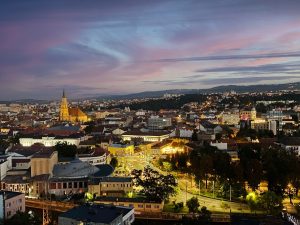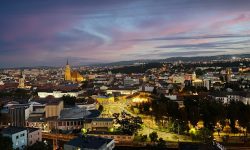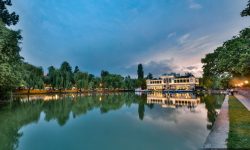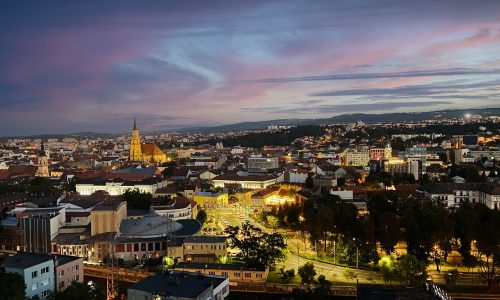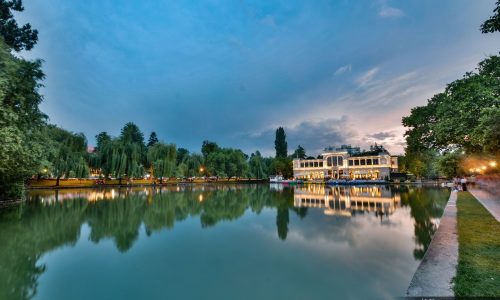Have you ever heard of the psychology of travel? Have you ever wondered what kind of psychological impact could traveling and moving abroad have on you? Read this article to learn more about these! Here are a few general aspects and a few specific pieces of advice essential to having a great time in Cluj-Napoca as a visitor or as an immigrant.
THE PSYCHOLOGY OF TRAVEL: HISTORY AND SCIENTIFIC DISCOVERIES
According to Addicted to Travel, the ability to surrendering one‘s sense of control in order to embrace adventure shows strength of character and flexibility. It is a sign of strength for someone to step into the unknown of travel and embrace it rather than feel nervous because of it. Humankind evolved to be able to wander.
Jean Kim M.D. beautifully explains the following: while the practical reality of money, health, and job and family obligations certainly matter and affect people’s ability to travel, whenever possible, travel is a worthy and sometimes underestimated goal for our daily existence. […]
Travel acts beneficially on multiple levels:
- Travel disrupts your routine and introduces novelty to your brain, which improves cognition and helps reactivate reward circuits. Initially, such changes can be stressful and frustrating […]. But ultimately, your brain can benefit from being put on its toes; according to one of Brent Crane’s articles, the cognitive flexibility helps stimulate neuroplasticity. This, in turn, can help generate creativity that persists even when travelers return home and helps with innovative idea generation at their jobs.
- Travel helps on an interpersonal growth level as well; seeing different people and cultures and encountering them directly as individuals and human beings opens yourself to becoming more tolerant and flexible about unfamiliar ways of life. Your sense of empathy can increase, which can help you feel better able to negotiate interpersonal issues back home as well. […]
- Travel itself can be a break from stressors piled up back home; a literal escape where you can focus on your own pleasure and yourself can be a welcome change of pace, and help reduce your body‘s stress hormone overdrive. Even when you return to stressors back home, the memories encoded by travel help maintain a “zen space” you can revisit whenever you need. […]
Overall, travel is a way to temporarily provide the goal of living life for its own sake, apart from the drudgery of daily responsibility and routine. It helps with personal growth and appreciation, and can also benefit mood and intellect. If you have the means to build travel into your schedule, by all means, do so.
Indeed, Michael Brein PhD., or “the travel psychologist” as he likes to call himself, supports the previously stated discoveries as well, saying that psychological science now reveals that there are complicated undercurrents to modern travel, from how travel affects our brains to why we make the tourism choices we do.
Like all human activity, travel can impact our lives in good and wonderful as well as bad and horrible ways. Travel psychology can help us maximize the good and minimize the bad in travel. Sometimes being more conscious or aware of our surroundings can be a lifesaver, knowing that we are largely unconscious of much that goes on around us in a completely new culture!
Additionally, JR Thorpe PhD. offers us more insight when it comes to the psychology of travel: the concept of travel isn’t a modern invention, though the level of accessibility to all members of society when it comes to traveling for pleasure likely is. Travel often had distinct practical purposes in many historic civilizations, from trade to scholarship to pilgrimage, but empires in particular probably involved pleasurable movement; higher-status ancient Romans and Egyptians indulged in private travel to various places under their control.
There’s an argument that travel increases basic human happiness because we are, at heart, a nomadic species, though it’s unclear how much itchy feet are culturally created and how much they’re inherent. Boosts in unique thinking have also been demonstrated to happen even if people are only contemplating a foreign location in their imaginations.
Brief periods of travel, however, may not be as beneficial as more extensive uprooting. It’s a big point of discussion. Mahatma Gandhi called travel “the language of peace,” but others have argued that anything less than extensive immersion in a culture over a significant period will be unlikely to broaden horizons or alter tolerance levels.
Being a tourist does seem to make genuine changes in our outlook. To get the most out of your trip, book while relaxed, stay a long time in one place, and weigh up the priorities of traveling alone.
YOUR MINDSET CREATES YOUR ATTITUDE
When deciding to travel to a different country or to move abroad, it is crucial to take some things into consideration. The mental preparation for the upcoming journey is as important (if not even more important) than the physical preparation. Whether you’re about to travel alone, with friends or with your family, whether you’re about to permanently relocate or not, here are a few general aspects you should be aware of and a few things to do before embarking on your journey:
Firstly, if you’re just traveling, especially alone, Rupert Wolfe Murray, an incredibly insightful freelance writer and communication expert, has a quick advice for you: expect and prepare your mind for the three phases of (independent) travel! These phases are:
a. The Before phase – Mentally prepare for your journey into the unknown;
It’s extremely healthy and important to familiarize yourself with your own mindset. We all need to know, update and improve ourselves from time to time, thus properly identifying our thoughts and feelings is vital. In order to be able to build a foundation for healthy living and enjoy optimal lifestyles, setting realistic expectations and restructuring our mindsets in a conscious and adaptive manner is considered to be one of the most important processes in our lives, yet due to different factors many of us remain unaware of our mindsets and their implications in real life until a major event occurs.
Such a major event could be an upcoming solo trip for example, which could ultimately trigger a need for self-awareness and self-preparation right before traveling, in order for it to be successful and pleasant.
Furthermore, it’s important to set reasonable goals for yourself while on a trip and to keep in mind the purpose of your journey. Try reminding yourself of what you want to achieve while traveling and keep yourself challenged and motivated.
This phase of mental preparation and this last piece of advice will also come in handy while on a trip to Cluj-Napoca, should you feel:
- stressed
Try thinking more rationally, keep your calm by relaxing and challenge your thoughts and perception of reality!
- unsure, uneasy, afraid, full of regrets or a bit like an alien
Try remembering that we’re all human: our flesh and blood are made of the same ingredients. We all feel like living, loving and progressing, we just happen to live in a different part of the world than you. Become familiar with us and let’s keep each other happy and inspired to do good things!
- sad, lonely and homesick
Allow yourself to feel all these things but always keep your eyes on your personal prize! All of these feelings are perfectly normal but don’t get stuck! Wonderful things are waiting for you: stay motivated, keep hoping for better things, smile, pick yourself up and rock your own world!
- responsible for a new experience
Fight your possible performance anxiety on your trip by remembering that you’re responsible of yourself first. Don’t be too hard on yourself! Whether you’re thrill-seeking or just looking for a new experience/a fresh start, find a comfort zone where you can feel safe first, generate your own happiness by keeping yourself aware of the beautiful little things in life and move forward from there! Challenge yourself, but seek stability first! Take time to adapt!
- excited and ready for whatever comes next
Perfect! Just keep yourself grounded, keep your eyes wide open and stay safe! It’s common sense really.
b. The During phase – The attitudes you need when you’re on the road;
This phase is closely related to the first one. To reiterate, what we think, feel and how we act towards something or someone is our attitude. It depends on our learnt mindsets (both conscious and subconscious) which depends on many other factors (our culture, personality, our temper, our previous experiences, on the way we grew up and were nurtured by our families and so on).
Ultimately, our mindsets (both learnt and willingly improved) determine our emotions. Fortunately, as implied above, we can identify and evaluate our mindsets while being able to alter them in our favour. Changing them is possible to some extent, for our own good.
Following a thorough self-discovery journey, it all comes down to our decision and ability to choose, learn and practise a more useful mindset, thus an optimal, adaptive attitude towards our trip and on the road. We’re talking about a slightly cautious openness here, about an elevated state of mind that allows you to experiment, enjoy, learn, grow, while staying safe.
Even if you’re coming from a totally different culture, exercise a non-judgemental mindset which will eventually lead you to self-enrichment. Take your time to discover, don’t jump to conclusions, stay calm, treat yourself, explore, enjoy whatever time you’ve got in this city and substitute frustration with gratitude when being tired or annoyed! Keep a caring and respectful attitude and everything will be alright. Your journey is your blessing!
c. The After phase – How to deal with the shock of coming home after some (a long) time spent somewhere totally different.
Find your own effective and efficient strategies! Relax, everything will be ok if you just take it easy!
Evidently, similar logic also applies to preparing for settling down in Cluj-Napoca. Naturally, a lot of aspects will change long-term-wise while others will stay relatively the same (e.g., the dynamics of your family, if they join you, as long as all of you previously agreed on congruent goals).
Don’t isolate yourself, keep yourself connected to the people close to you and make new friends! You need a support system. If you feel like you don’t have it (yet), you can always choose from our many dedicated and efficient psychotherapists and counselors here to help you with coping with your new lifestyle. Don’t hesitate to contact someone (a friend and/or a professional) if you need help! It’s perfectly normal.
DEMOGRAPHICS AND CULTURE
As a general rule, when traveling to Cluj-Napoca (just as when you’re traveling to any other city and country), expect cultural differences to some degree. Knowing that Romania is part of the Eastern Europe might help you with figuring out your expectations, yet your real experience here will most definitely be somewhat different from the ones you’ve probably read about on travel blogs, in the newspaper and on the travel forums; different from some stories your relatives might have told you about.
Traveling is beyond expectations and stereotypes, in a good way, if I may say so. Why? Because a journey is a personal experience: it depends on who you are as an individual and on what and whom you come across while traveling. Still, it’s healthy to set some rational expectations. They shouldn’t limit your motivation to explore (Cluj-Napoca is a safe place) but rather guide you and help you get the most of your trip.
Whether you’re coming here for tourism or you’re ready to settle down in Cluj-Napoca, you should definitely know that we’re good people, very welcoming, most of us usually like to help other people out (depends on whom you’re asking for help though), but sometimes some of us have a bit of a hard time knowing how to help the foreigners. Nevertheless, more than 95% of the time most young adults and other grown-ups will be able to help you with tips, directions and other information. Be trustworthy and friendly enough and we’ll probably have you stay at our tables, offer you accommodation until you figure out your own place, help you move your furniture, lend you things, take you places and support and have fun with you in no time.
Cluj-Napoca is the city of the young nowadays. Culture and education are very respected and constantly promoted here. It’s an Eastern European city with a predominantly Western approach on life and progress. Our mayor teams up well with professionals and other visionary and creative people out there to ensure the development of this city and the well-being of its people, which is truly appreciated. But of course, there is always room for more.
You should also know that Cluj-Napoca is officially Christian (Romania is officially a Christian country), yet we’re generally open to welcoming and befriending people of other faiths, beliefs and religions as well, as long as they’re peaceful, respectful and civilised. We encourage everyone to be nice, thoughtful, decent and fun too. Paradoxically, many of us are both conservative yet liberal in our views at the same time. We tend to believe that most of us are fairly balanced when it comes to opinions and mentalities, yet we’re all different, of course.
Moreover, given the opportunity, individually, we’re very likely to offer a helping hand and facilitate your successful adaptation to your adoptive society, but you should also know that the quality of your experiences may vary from satisfactory to less satisfactory when it comes to different interactions with the Institutions of the State.
WORK AND LEISURE
Finding a job in Cluj-Napoca is something some could easily tick off their to-do list. Oppositely, it could take some time for others to find a workplace. Nobody can accurately predict this for you. Based on your level of education, on your training, experience, on your idea of a dream job, before long you could be working. It’s also very possible that you’ll have to wait a little, climb the ladder for a while, settle for a few temporary jobs, get some certificates for the equivalence/recognition of diplomas. All in all, it shouldn’t be very hard to find at least a regular job of which you could ultimately grow out.
Furthermore, depending on where you come from, the minimum wage here could satisfy you or it could shock you. Properly inform yourself before moving to Cluj-Napoca!
We’ve got plenty of jobs here (especially when it comes to I.T.), and the wages here are generally higher than in other areas of this country, but the salary you get depends on more than one factor. Your area of expertise is extremely important if you’re aiming for a large sum of money. The good news is that you can always outgrow your current employment status.
When it comes to fun and leisure activities, they’re usually diverse. Having fun in Cluj-Napoca is definitely cheaper for foreigners who’ve been economically stable before coming to Romania and more expensive to our fellow Romanians (the price of things is expensive compared to the minimum wage here). Generally, if you can afford having fun in other countries, you can definitely have some good, quality fun here as well.
The people here are great, we’ve got enjoyable pubs, lovely restaurants, amazing delivery apps, cultural events, some large shopping centres if you feel like getting on a good old shopping spree, interesting courses you could apply too and so on.
ACCOMMODATION
Depending on your existing economic status, you could buy a place in Cluj-Napoca in a reasonable amount of time, but renting usually comes across as being more accessible, especially in the first few years of living here.
Try airbnb for a reliable source of accommodation until you figure out a more long-term option. Additionally, look up relevant information on accommodation on Piata de la A la Z.
Pay attention to the renting fees and the damage deposits in Cluj-Napoca though! This area of interest is temporarily problematic here. Please check this website for more news!
Moreover, it would be wise for you to be able to meet with the landlord, visit the property he/she’s letting and sign the contract for your new place to stay at a month ahead of your official arrival here at least. Also, try flatsharing as well, if you will.
Check out the Cluj-Napoca facebook groups for this, but again, beware of scams! Consequently, it might be a good idea for you to make a good Romanian friend: it would be of great help. Don’t isolate yourself!
LANGUAGE AND COMMUNICATION
Naturally, Cluj-Napoca is mostly a Romanian-speaking city. The Hungarian language (Magyar) is also quite frequent here. As mentioned before, we believe that we’re quite a multiculturally diverse city, therefore you are likely to find other people of the same nationality as you to bond with.
Even though learning Romanian would definitely represent an advantage as far as communicating with us is concerned, by all means feel free to use English in your conversations with us whenever you need to! Many of us, clujenii, are somewhat fluent in this international language, or at least at a basic communication level. Furthermore, it’s just as fine if you’re using Romgleză (a convenient combination of Romanian and English) with us. Just use the Romanian words you’ve learnt so far and combine them with some English ones. We promise we’ll figure out what your message to us is eventually and proceed with helping you! You could also try speaking some French, just don’t expect too many of us to speak it back to you, but who knows, you might actually be lucky in this respect as well!
On the whole, we would like to wish you good luck with everything and say a warm “welcome to Cluj-Napoca” to you! We hope you found this article useful! Should you have any further questions and/or suggestions, please let us know! We’ll definitely try to be of some assistance to you.
Cheers!
Check this out!
References
- Crane, B. (2015). For a More Creative Brain, Travel. Retrieved 14 February 2017, from https://www.theatlantic.com/health/archive/2015/03/for-a-more-creative-brain-travel/388135/
- Gilbert, D. and Abdullah, J. (2002). A study of the impact of the expectation of a holiday on an individual’s sense of well-being. Journal of Vacation Marketing, 8(4), p.352-361.
- Kumar, A., Killingsworth, M. A., and Gilovich, T. (2014). Waiting for Merlot: Anticipatory Consumption of Experiential and Material Purchases. Psychological Science, 25(10), p.1924-1931.
- Tadmor, C. T., Galinsky, A. D., & Maddux, W. W. (2012). Getting the most out of living abroad: Biculturalism and integrative complexity as key drivers of creative and professional success. Journal of Personality and Social Psychology, 103(3), 520-542.
- US Travel Association. (2015). Travel Strengthens Relationships and Ignites Romance (p. 1-2). Washington DC: US Travel Association. Retrieved from https://www.ustravel.org/sites/default/files/Media%20Root/5.2015_Relationship_ExecSummary.pdf
- William, D. K. (n.d.) Science Proves That Traveling Can Boost Your Health and Overall Well-Being. Retrieved 14 February 2017, from http://www.lifehack.org/338212/science-proves-that-travelling-can-boost-your-health-and-overall-well-being
- Zimmerman, J. and Neyer, F. J. (2013). Do we become a different person when hitting the road? Personality development of sojourners. Journal of Personality and Social Psychology, 105(3), p515-530.
- https://roomscesme.com/the-psychology-of-travel/
- https://www.psychologytoday.com/us/blog/culture-shrink/201803/why-travel-is-good-your-mental-health
- https://michaelbrein.com/travel-psychology/travel-psychology-university/travel-psychology-faq/
- https://www.bustle.com/p/why-do-we-travel-for-pleasure-the-psychology-of-tourism-explored-41207
- https://wolfemurray.com/the-psychology-of-travel/
- https://psychcentral.com/blog/how-travel-can-benefit-our-mental-health/
